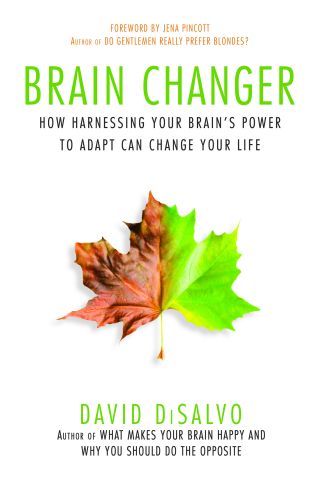Career
Tools That Deliver a “Leg Up” on Your Brain’s Power
How to leverage your brain’s power to problem solve and make sounder decisions.
Posted January 23, 2014

I am a believer. In his book, Brain Changer: How Harnessing Your Brain’s Power to Adapt Can Change Your Life, David DiSalvo offers 30 Brain Changer Principles that will not only surprise you, but also will alter how you think and subsequently respond or act. They range from chewing gum to learning how to stop certain thoughts. I tried the latter with negative thoughts I had been carrying around way too long; it worked!
Each Brain Changer Principle (BCP) is a powerful instrument in its own right to help solve many problems we face—whether at home or on the job. DiSalvo explains the science behind his principles and how to apply them to your personal problems or issues.
When it comes to disciplining children, for example, parents often find themselves vowing to implement new strategies or set new rules. Often, however, we revert to doing what we always do. In short, we act before we think. We would do our children and ourselves a service if we followed DiSalvo’s “Awareness Wedge,” or BCP #1.
The Awareness Wedge
DiSalvo says, “One of the most basic metacognitive tools we have at our disposal is our ability to pause before taking the next action in a sequence of actions.” Think about the last time your children were arguing or fighting over a toy or simply needling each other to get your attention. What was your immediate reaction? Did you stop before you sent the children to their rooms or punished them another way, before you yelled, or possibly physically separated them? Probably not.
According to DiSalvo, by using the Awareness Wedge, “We have the ability to pause our thinking for short and long durations—even under intense pressure [say, screaming children]—which provides an invaluable opportunity to reevaluate before taking the next action step.” In the example of arguing siblings, the results can bring more lasting calm to your household.
The “Tactical Pause”

The “Tactical Pause”
Maybe you are in the habit of taking sides or blaming the wrong child just to find a resolution or some peace and quiet. DiSalvo recommends a “tactical pause” to take stock. It’s a conscious mental maneuver that allows you to consider whether or not your response to children’s squabbling will just add fuel to their fire, upset one of them more, look as if you are playing favorites, or actually be constructive in improving their relationships and subsequently your happiness.
By using a “tactical pause” you might become aware that one of the children had a tough day at school and a few minutes of empathy from you might end the disagreement. Or, the Awareness Wedge might allow you to consider if your instinctive reaction to arguing siblings might be related to how you were with your own sibling(s).
Focus on the Routine
Once you latch onto the “Awareness Wedge,” you can begin to work with the second brain changing recommendation in DiSalvo’s tool kit or what he calls The Thought Box: “The Golden Rule of Habit Change.” It is designed to transform your behavior and consequently, in this example, that of your bickering children. To alter a habit, DiSalvo explains, “You must focus on the routine, not the cue or reward.” Your routine might be to raise your voice or place blame.
Here are a few constructive alternatives: When life is calm, ask your children to spell out some positives about the sibling(s) they are frequently at odds with; take time to make sure each child feels as if he or she is listened to by you; make house rules clear—no hitting, no telling on each other. When they “start in,” remind them of the rules.
Ultimately, you get the reward: a more peaceful home with children who, while they still may fight, will probably do so less frequently and will ideally become more supportive of each other. Long term, the odds are better that your family will be close knit and the siblings in it are more likely to respect and love each other.
When you try the “Awareness Wedge” and/or “The Golden Rule of Habit Change,” please share your results in the comment section.
Any single one of the 30 brain changing tools helps leverage your brain’s power to problem solve and make sounder decisions—with your partner, your friends, work colleagues or bosses, and relatives. David DiSalvo’s “tool kit” is definitely worth exploring.
Related: Mom and Dad Love Me Best (Are You Sure?), Who is the Most Violent Person in Your Family?
Reference: DiSalvo, David. Brain Changer: How Harnessing Your Brain’s Power to Adapt Can Change Your Life. Dallas: BenBella Books, 2013.
· Follow Susan Newman on Twitter and Facebook
· Sign up for Dr. Newman's monthly Family Life Alert Newsletter
· Visit Susan's website: www.susannewmanphd.com
· See Susan’s latest book: The Case for the Only Child: Your Essential Guide
Copyright @ 2014 Susan Newman




